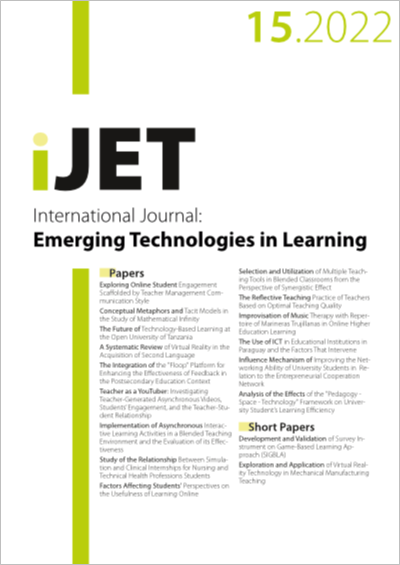Analysis of the Effects of the "Pedagogy - Space - Technology" Framework on University Student’s Learning Efficiency
DOI:
https://doi.org/10.3991/ijet.v17i15.33175Keywords:
internal-driving and external-guiding teaching model, PST framework learning space, empirical analysis, learning efficiencyAbstract
In the background of the global COVID-19 pandemic, the popularization of intelligent online teaching platforms dominated by advanced teaching technologies is accelerated. Pedagogy-Space-Technology (PST) framework learning space provides students high-quality teaching resources, the overall learning efficiency of students is dissatisfying because students lack intrinsic motivation to learn. Based on existing “intelligent teaching platforms of the PST framework” and combining with the principle of improving internal drive force of students through external guiding strategies, an experiment was designed in this study. The course Technical Analysis of the Financial Markets launched as an open online optional course for Chinese six undergraduate universities in 2021, and was chosen as the research example. Experimental data in 16 weeks were collected to analyze the effects of the PST framework learning space on overall intrinsic learning ability, staged academic performances, and online learning behaviors and improvement degree of intrinsic independent learning ability of students. The students’ independent learning ability is generally improved, but their attitude improvement is not obvious. The academic performances of students are generally improved, especially for students with low intrinsic independent learning ability. The online learning behaviors of students with low intrinsic independent learning ability are not dissatisfying, but their independent learning ability is improved significantly. In this study, the relationship between the PST framework learning space and learning efficiency of students was disclosed from the perspective of the internal-driving and external-guiding teaching model. The obtained conclusion provides a way for university teachers to provide students with emotional support, design multiple teaching technological activity combined strategies, offer external guidance with timely and high-efficiency feedbacks, and improve learning efficiency.
Downloads
Published
How to Cite
Issue
Section
License
Copyright (c) 2022 Jianxin Bi, Jinlong Chen

This work is licensed under a Creative Commons Attribution 4.0 International License.



